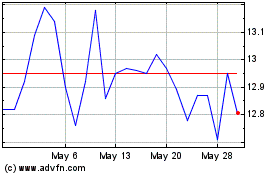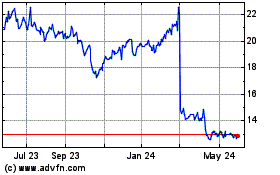Uber Buys Food-Delivery Rival -- WSJ
July 07 2020 - 2:02AM
Dow Jones News
Firm's $2.65 billion deal for Postmates expands reach in market,
fuels hope of ride-share gain
By Heather Haddon
This article is being republished as part of our daily
reproduction of WSJ.com articles that also appeared in the U.S.
print edition of The Wall Street Journal (July 7, 2020).
Uber Technologies Inc. said its $2.65 billion deal for rival
Postmates Inc. will help it better compete in restaurant delivery
and the market for delivering groceries and other staples, a signal
of the ride-hailing company's ambitions to provide a wider range of
items to consumer doorsteps.
With its all-stock purchase of Postmates, Uber would become the
second-largest restaurant delivery service in the U.S. by market
share, following DoorDash Inc., according to research firm Edison
Trends. Grubhub Inc. ranks third.
San Francisco-based Uber said it was attracted to Postmates both
for its large delivery presence in several U.S. cities and
partnerships with companies including Walgreens Boots Alliance Inc.
and Seven & i Holdings Co.'s 7-Eleven. But Uber executives said
the deal also presents an opportunity to bring more customers to
its ride-share business, which has been rocked as the coronavirus
pandemic has hurt demand across its markets for months.
"These every day, frequent interactions create habits with
customers," Chief Executive Dara Khosrowshahi said in an investor
call Monday.
Uber shares rose 6% in Monday trading. Rival Grubhub closed 4.4%
higher, a sign that investors welcome consolidation in the delivery
sector.
Competition in food delivery has grown rampant across the globe,
fueling deals to help companies reach profitability. Uber sought to
buy Grubhub earlier this year to shore up its position in the U.S.,
but the deal fell apart under regulatory concerns and disagreements
over a price. Dutch food-delivery giant Just Eat Takeaway.com NV
and Grubhub last month agreed to a deal for more than $7
billion.
The pandemic, though, has provided an opportunity for Uber and
its rivals in food delivery. Grubhub's orders grew 28% in April and
May compared with the previous year as diners turned more to
delivery during the pandemic, according to an investor
presentation.
Uber said Monday that bookings for its Eats division in its
second quarter more than doubled from the previous year. Postmates
said its gross orders grew 50% in its second quarter from the
previous one, with the majority of those transactions coming from
restaurants.
Online grocery delivery has also boomed during the pandemic,
with online service Instacart Inc. reporting a surge in orders from
supermarkets. A number of restaurant delivery players have tried to
get a cut of the grocery market. DoorDash does grocery delivery for
Walmart Inc., and Uber took a majority stake in grocery-delivery
company Cornershop.
Mr. Khosrowshahi said he expects competition to last in
restaurant delivery in the U.S. for years, fueling the company's
interest to get into other to-go services even if that means
bumping up against Amazon.com Inc. and Walmart.
"The category and markets are going to start overlapping with a
lot of other players," he said.
The deal will translate into continuing discounts as rivals try
to compete for customers and restaurants, said Robert Mollins, of
market-research firm Gordon Haskett. "The promotional environment
won't be slowing down anytime soon," Mr. Mollins wrote in a
note.
Uber Eats has a larger international footprint than its other
U.S.-based food-delivery rivals. The ride-share company said Monday
that Eats has a top position in dozens of global cities, including
London, Paris and Mexico City.
Postmates, founded in 2011 and based in San Francisco, is the
smallest among the major U.S. food-delivery companies. The company
had raised more than $900 million in funding, according to
PitchBook.
Postmates held discussions with other possible buyers since at
least last year, and had evaluated pursuing an initial public
offering.
The deal will boost Uber's food footprint in Los Angeles, Las
Vegas, Phoenix and other cities in the South and West that remain
Postmates strongholds. Postmates had $643 million in gross bookings
in its first quarter this year, translating into $107 million in
revenue, according to a presentation.
Uber said it would keep the Postmates app running separately
after the deal's closing, expected in the first quarter of 2021. It
will provide bridge financing to Postmates until the deal's close,
Uber said. The companies anticipate the transaction could yield
$200 million in cost savings, mostly due to reductions in sales,
marketing and other administrative costs.
--Dave Sebastian contributed to this article.
Write to Heather Haddon at heather.haddon@wsj.com
(END) Dow Jones Newswires
July 07, 2020 02:47 ET (06:47 GMT)
Copyright (c) 2020 Dow Jones & Company, Inc.
Seven and I (PK) (USOTC:SVNDY)
Historical Stock Chart
From Dec 2024 to Jan 2025

Seven and I (PK) (USOTC:SVNDY)
Historical Stock Chart
From Jan 2024 to Jan 2025
